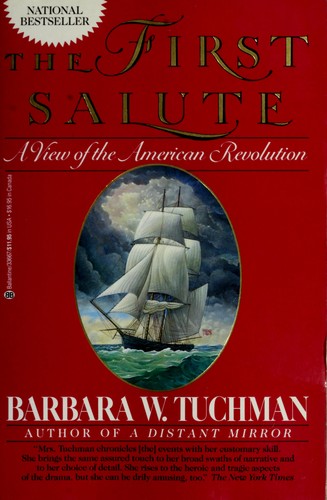


"First Salute" is the best book I've read on the American Revolution. Detailed maps and a generous amount of illustrations accompany this book, as well as an extensive amount of source material.

While interesting in its scope and discussion of the foreign weight and influence in the American Revolution, the dryness and spotlights on minor affairs and people involved may leave the reader rather fatigued and unfulfilled by an otherwise fascinating transcontinental history. Outnumbered, they were ordered by Tarleton to retreat, while Lauzun’s men charged in pursuit, protected in their turn by the steady fire of the Virginia militia.īy the end of the book, it becomes apparent that each chapter discussed could very well have had its own separate book-and that wouldn’t necessarily be an issue when considering Tuchman’s expertise and commitment to thorough research. When a horse wounded by a lance thrust collided with Tarleton’s, he was thrown his dragoons scrambled to his rescue, enabling him to seize another horse to remount and escape under the protective rifle fire of his infantry. …Tarleton had led his Cavalry Legion out for foraging and was returning with wagons loaded with Indian corn when he was met in a narrow lane by Lauzun’s legion armed with lances. Whether involving French matters of trade policy with the infant nation, or the manner of titles in command and troop strength in battles-there are fascinating tidbits and concise biographies of France’s contribution and its liberty-minded gentry: As the focus is a bit blurred from one plot being uncovered to the next, the real gems are found in the alliance between France and America. Unfortunately, the chronology feels scattered by such random tangents as the naval escapades of England’s Admiral Rodney, overdrawn histories of the rivalries and alliances of the three European powers being discussed, and ultra-specific details on such matters as negotiations, frustrations, and battles.

Beginning with the very first acknowledgement of American Independence from a foreign nation (by a colony of the Dutch Republic), and ending with the aftermath and legacy of Yorktown, Tuchman sets a nice pace throughout. In taking on the unique task of researching and writing about the American Revolution through the transcontinental financial and wartime policies of the Dutch Republic, England, and France, this book meets its target-but misses drastically when keeping the reader’s attention, sense of depth, and pleasure. Tuchman was known for her substantial amount of contributions to the genre of history, and just before passing away, she added one final historical work to bookshelves and audiences alike. Historian and two-time Pulitzer Prize winner Barbara W.


 0 kommentar(er)
0 kommentar(er)
